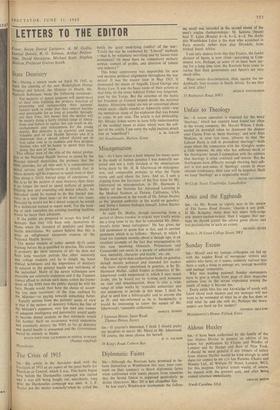The Crisis of 1915
Sm.—My article in the Spectator dealt with the Coalition of 1915 as an aspect of the great battle for Freedom or Control, which it was. This battle began long before the Dardanelles campaign was started and it was still being fought out, mercilessly, long after the Dardanelles campaign was over. A. J. P. Taylor put the matter concisely' when he called the battle the 'great underlying conflict' of the war: 'Could the war be conducted by "Liberal" methods —that is, by voluntary recruiting and by laissez-faire economics? Or must there be compulsory military service, control of profits, and direction of labour and industry'?'
This bitter controversy was responsible for new and decisive political alignments throughout the war period. It was the master issue in May 1915. It dominated the minds of Asquith, Lloyd George and Bonar Law. It was the basic cause of their actions at that time. In the event Admiral Fisher was forgotten, even by the Tories. But the outcome of the battle for Freedom or Control helped decide the national destiny. Historians today are not so concerned about which spark--shells scandal or Admiralty crisis—was the immediate cause of the explosion that was bound to come, in any case. The article is not misleading. Mr. Rhodes James seems to have little understanding of the cardinal issues at stake, which were the sub- ject of the article. I am sorry the valid analysis struck


































 Previous page
Previous page